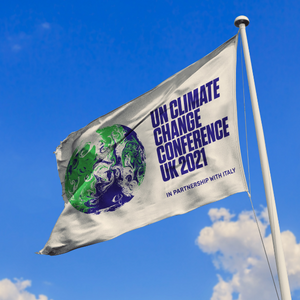
Reflecting after the end of the 2021 United Nations Climate Change Conference – more commonly known as COP26 – our Trust Lead for Strategy and Sustainability Anna Foster has shared three things that are keeping her hopeful about the future of sustainable healthcare…
At Cumbria, Northumberland, Tyne and Wear NHS Foundation Trust, we are working towards providing sustainable healthcare, that does not cause harm to the planet or to future generations. This is vital because we know that vulnerable people, including those with learning disabilities and mental health issues who we support and care for, are more vulnerable to the impact of climate and ecological change.
I desperately hoped that COP26 would result in commitment to real change. But sadly, like many others, I found myself disappointed at the level of ambition within the final agreement that the nations reached.
Despite this, I was heartened to see much more emphasis on the health impact of climate change during the conference. Here are my top 3 reasons for optimism:
- Channel 4 shone a spotlight on how climate change affects disabled people.
Ruben Reuter, an actor and presenter with Down’s Syndrome who has presented several stories about disability for Channel 4 News, reported from COP26 in Glasgow. His piece focussed on how people with learning disabilities can understand climate change, and how it impacts disabled people disproportionately across the world.
Watch Reuben’s report here. - Events and attendees raised awareness of the impact climate change has on mental health.The Royal College of Psychiatrists , the Mental Health Foundation, and the Centre for Mental Health all took part in events during COP26 to raise awareness of the impact of climate change on peoples’ mental health.
A special event run jointly by the Royal College of Psychiatrists, the Royal College of Physicians and the Royal College of Paediatrics and Child Health focussed on the impacts of climate change on different aspects of health, and the need for healthcare systems to adapt now so we are resilient to the effects of climate change. (Watch a recording of the Royal Colleges event here.) The Royal College of Psychiatrists had observer status at the conference, and reported back regularly via blog posts. You can read their blogs here.
The Mental Health Foundation also held an event at COP26 which brought together experts from around the world, to share what is already known about the links between climate change and mental health and to determine what research still needs to be done. (Watch a recording of the Mental Health Foundation event here.) And November also saw the publication of a position statement from Centre for Mental Health on the climate emergency and mental health.
- There was an urgent call for climate action from the health community.
An open letter representing 45 million health professionals worldwide was published in over 200 health journals, urging world leaders to tackle harm to health from climate change. The Healthy Climate letter to national leaders and delegations at COP26 was supported by the Global Climate and Health Alliance and the World Health Organization, in service of the medical and health community around the world. Read the letter here.
To find out more about how we at CNTW are working towards sustainable healthcare, you can read about our Green Plan and the progress we have made so far.
